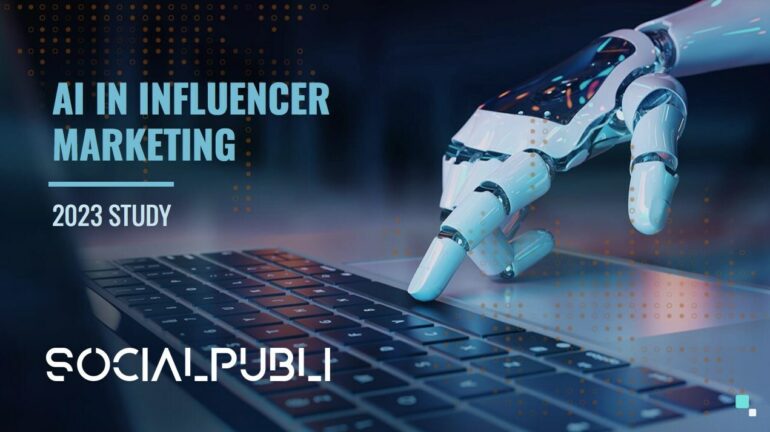TL;DR:
- SocialPubli unveils the “AI in Influencer Marketing 2023 Study.”
- AI is transforming influencer marketing across various aspects.
- Influencers and marketers express cautious optimism about AI.
- Transparency and trust are key concerns in the AI-driven influencer landscape.
Main AI News:
SocialPubli, a pioneering global micro-influencer marketing platform, has unveiled its latest annual report, the “AI in Influencer Marketing 2023 Study.” This comprehensive examination, conducted in collaboration with influencers and marketers, delves into the profound impact of Artificial Intelligence (AI) on the industry.
AI, while still in its nascent stages, has already wrought substantial changes in key facets of influencer marketing. From ideation and content creation to influencer selection, vetting, and campaign performance analytics, AI’s influence looms large. However, this transformative technology is not without its uncertainties.
Ismael El-Qudsi, the CEO of SocialPubli, notes, “Nine in ten influencers are already well-acquainted with artificial intelligence, with half of them incorporating AI into their workflow. Among agencies, nearly eight in ten marketers harness the power of AI, signaling its growing potential to fortify and elevate collaborations between brands and influencers.”
The survey, conducted by SocialPubli, spanned 1,235 influencers and marketers from 73 agencies across Europe and the Americas.
Influencers and AI: Navigating the New Paradigm
Influencers’ perceptions of AI vary, yet most tend towards cautious optimism regarding its societal and occupational impact:
- AI – A Threat or an Opportunity?: A resounding 71.4 percent of influencers view AI as an opportunity for growth and success.
- Current Use of AI: 51.7 percent of influencers are already harnessing AI to augment their work, with prominent applications including idea generation (45 percent) and content creation (34 percent).
- Virtual Influencers: Approximately 30 percent of influencers engage with virtual influencers.
- Trust and Reliability: A significant majority of influencers place their trust in AI-generated information, with nearly 64 percent relying on its data.
- Future Outlook: 36.9 percent of influencers express excitement as the prevailing sentiment towards increased AI adoption, while 41 percent report a mixture of excitement and concern.
- Transparency: Two-thirds of influencers are willing to disclose their use of AI to their followers, though a notable one-third deem such disclosures unnecessary.
Marketers and AI: The Drive Towards Progress
Marketers predominantly perceive AI as a boon, employing it for diverse tasks while stressing the importance of trust in AI data and advocating for transparency in disclosures:
- AI – A Threat or an Opportunity?: A robust 81.7 percent of marketers view AI as an opportunity.
- Current Use of AI: The most prevalent applications encompass social media copy (47.2 percent), image or video generation (38.9 percent), editing (36.1 percent), and research (34.7 percent).
- Virtual Influencers: While 62 percent of marketers are open to collaborating with virtual influencers, only 27.5 percent have engaged with them, of whom 21.7 percent have reported positive outcomes.
- Trust and Reliability: An impressive 76.1 percent of marketers express trust in AI-generated data, indicating a readiness to integrate AI into their workflows.
- Future Outlook: Nearly 55 percent of marketers are more enthusiastic than apprehensive about the ascent of artificial intelligence, with only 15.5 percent harboring concerns or negative perceptions.
- Transparency: A substantial 84.7 percent of marketers advocate for influencers to disclose their use of AI in sponsored campaigns.
El-Qudsi underscores the pivotal role of authenticity in influencer marketing, asserting, “AI is an evolving technology, replete with gray areas that require identification and resolution as it garners wider acceptance. As the potential for AI integration in marketing expands, it becomes imperative for brands and influencers to collaboratively define the parameters that matter most, including transparency in communication and AI tool utilization to bolster their content endeavors.”
Conclusion:
The integration of AI into influencer marketing is rapidly changing the industry landscape. Influencers and marketers alike are recognizing the potential for growth and success, with a focus on transparency and trust in AI data. Collaborative efforts between brands and influencers will be pivotal in harnessing the full potential of AI, ultimately reshaping the influencer marketing landscape.

